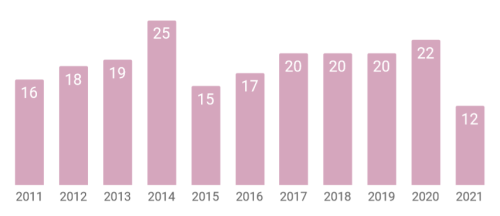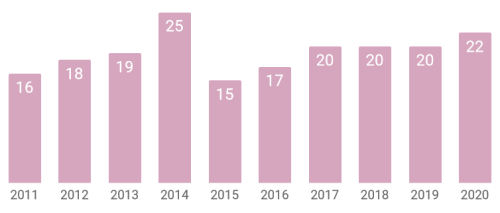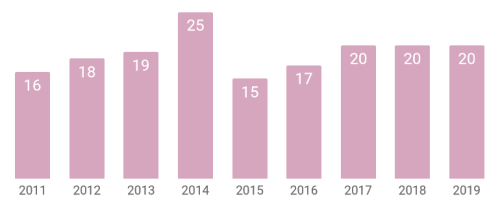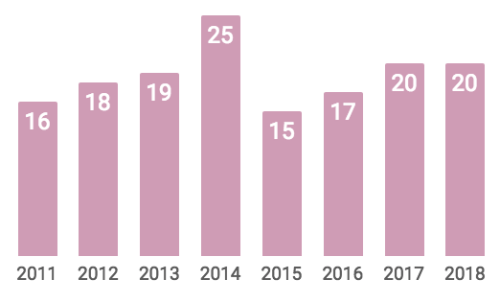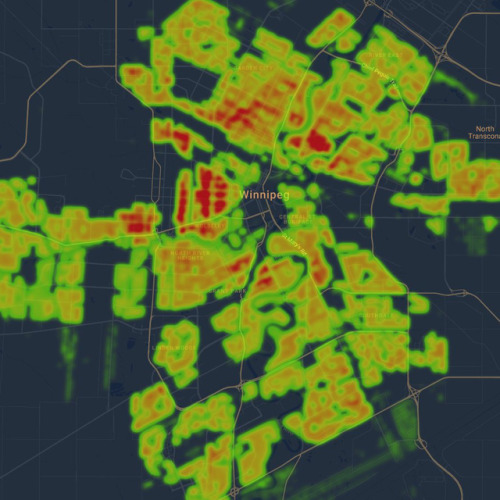I read 20 books last year. All twenty books were deadtree format. Fourteen of them were fiction. Six were non-fiction. I continued to read to the girls almost every night. Together we read an additional 9 chapter books and oodles of picture books. I managed to drop a few shows from my podcatcher. Our family listened to 700 hours of music.
2019 was a year of re-reading favourites from my youth as well as more recent favourites. A year of nostalgia and retrospection! I enjoyed the journey and am planning on re-reading one book a year from here out.
Fiction in 2019
- Fifth Business - Robertson Davies - Of saints and fools and the revenge of the unlived life. - “God, youth is a terrible time! So much feeling and so little notion of how to handle it!”
- The Manticore - Robertson Davies - Humanity’s mythic past and the archetypes that shape our lives. - “My job is to listen to people say things they very badly want to tell but are afraid nobody else will understand.”
- World of Wonders - Robertson Davies - A life of roughness and cruelty transformed by magic. - “We have educated ourselves into a world from which wonder, and the fear and dread and splendor and freedom of wonder have been banished.”
- Siddhartha - Hermann Hesse - The wisdom of a river. The meaning of a life. Every truth contains it’s opposite. Enlightenment through strife. - “Words do not express thoughts very well. They always become a little different immediately after they are expressed, a little distorted, a little foolish.” (Available for free on Project Gutenberg.)
- Over Sea, Under Stone - Susan Cooper - Three siblings find and protect the holy grail in a 1960s English sea-side town. Their uncle may or may not be Merlin. - “You can’t find a treasure map and just say, ‘Oh, how nice,’ and put it back again.”
- The Old Man and The Sea - Ernest Hemingway - What you can do with what there is. Such a frustrating protag! - “It is better to be lucky. But I would rather be exact. Then when luck comes you are ready.”
- Martian Chronicles - Ray Bradbury - Colonialism on the red planet.
“Sleeping beauty awoke at the kiss of a scientist and expired at the fatal puncture of his syringe.”
- Franny And Zoe - J. D. Salinger - Walking the razor’s edge between ennui and egoism. - “I’m sick of not having the courage to be an absolute nobody.”
- The Stranger - Albert Camus - A stranger to himself and indifferent to the world. - “Then I fired four more times at the motionless body where the bullets lodged without leaving a trace. And it was like knocking four quick times on the door of unhappiness.”
- Slaughter House Five - Kurt Vonnegut Jr. - Billy Pilgrim is unstuck in time. A duty-dance with death. - “And so it goes.”
- Origin - Dan Brown - AI, evolution and the end of religion. Summertime guilty pleasure. Not a re-read. - “May our philosophies keep pace with our technologies. May our compassion keep pace with our powers.”
- Exhalation - Ted Chiang - Mind-expanding sci-fi shorts with a focus on fate and choice. - “Free will is a kind of miracle; when we make a genuine choice, we bring about a result that cannot be reduced to the workings of physical law. Every act of volition is, like the creation of the universe, a first cause.”
- Anathem - Neal Stephenson - An epic alternate history of the western philosophical tradition. - “The mystic nails a symbol to one meaning that was true for a moment but soon becomes false. The poet, on the other hand, sees that truth while it’s true but understands that symbols are always in flux and that their meanings are fleeting.”
- Dune - Frank Herbert - Destiny, fanaticism, ecology, and the spice melange. “[T]he mystery of life isn’t a problem to solve, but a reality to experience.”
Read in that order.
Top Four Books in 2019
Top three re-reads and then one book that was (for the most part) new to me:
Anathem by Neal Stephenson and Dune by Frank Herbert
Anathem and Dune are my top two all-time favourite sci-fi books. They did not disappoint.
Similarities: Epic world building. The nature of reality. The mysteries of consciousness and free will. Long now thinking. Neologistic dictionaries. Appendices. Myth, mysticism and religion. Math, science and philosophy.
Difference: Although I’d never wish to visit Dune’s desert plant of Arrakis, I’d love to spend a few years living amongst the avout in a Mathic concent on Arbre.
The Deptford Trilogy by Robertson Davies
I’m going to cheat and pick the entire Deptford Trilogy rather than just one book. I’m hooked on Davies again and will now have to re-read all his other trilogies. There are fates worse than this.
Myth, magic, psychology, history and a dash of rural Canada in the first half of the 20th century.
Exhalation by Ted Chiang
I’d read one of these short stories before, The Lifecycle of Software Objects, a must read for all AI enthusiasts / apologists. Read Online.
I also recommend listening to Levar Burton read The Merchant and the Alchemist’s Gate, a tale of time-travel in medieval Baghdad. Listen to Part 1 and Part 2 on Stitcher, or Part 1 and Part 2 on Spotify.
Non-Fiction in 2019
Top Three Non-Fiction in 2019
Nonviolent Communication by Marshall B. Rosenberg
With Nonviolent Communication (NVC) we learn to hear our own deeper needs and those of others. Communication as a spiritual practice involving deep listening, empathy and compassion. Observations, Feelings, Needs, Requests.
I might have to re-read this one yearly.
Honey I Wrecked the Kids by Alyson Schafer
Pairs nicely with NVC. Highly recommended for all parents. Don’t let the intro scare you off. This isn’t just a book for families experiencing major behavioural difficulties. This is a guide to family harmony based on “the three Cs”:
- When kids don’t feel connected they’ll seek attention.
- When they don’t feel capable they’ll seek power.
- When they don’t feel counted they’ll seek revenge.
- When they don’t feel courageous they’ll seek avoidance.
The Practicing Mind by Thomas M. Sterner
“Everything in life worth achieving requires practice. In fact, life itself is nothing more than one long practice session, an endless effort of refining our motions.”
We are what we do!
Family Books in 2019
This was the year I started reading chapter books to the girls. We read:
Mixed in to our nightly reading were about 150 picture books and graphic novels from the library.
The non-fiction family book that stood out was Sex is a funny word : a book about bodies, feelings, and YOU by Cory Silverberg, with illustrations by Fiona Smyth. An age appropriate cartoon book about bodies, gender, and sexuality.
Podcasts in 2019
The plan for 2019 was to pare down my podcasts, but I only managed to drop my show count from 23 to 20. My unlistened episodes queue is currently at 17. I estimate that I’ve listened to over 410 hours of podcasts this year, the equivalent of 17 24-hour days. I also switched apps from BeyondPod to Pocket Casts. I listen to most podcasts at 1 to 1.2x speed with silent gaps removed.
Podcasts still in rotation:
CBC Ideas, Commons, Greater than Code, Hanselminutes, Invisibilia, Javascript Jabber, Long Now Seminars, Overdue, Philosophize This!, Philosophy Bites, Reply All, Song Exploder, Syntax, The Bike Shed, The Public Philosopher, The Ruby Rogues, The Tim Ferriss Show, Think Again, This American Life, Views on Vue
Top Three Podcasts
Commons with Arshy Mann
In 2019 Commons focused on Canadian oil and Canadian dynasties.
Fav Episodes: CRUDE #2 – Bombs, Blood & the Battle of Trickle Creek, CRUDE #5 – A Town, Annihilated, and DYNASTIES #3 – The Fords
Overdue with Andrew Cunningham and Craig Getting
Andrew and Craig take turns reading books and telling each other about them. The things they say are funny and smart. I only listen to episodes for books I’ve read.
I recommend digging through their back catalogue to find your favourite books. For example, they’ve got an episode on Dune, The Martian Chronicles, Franny and Zooey, The Old Man and the Sea, Siddhartha, and Slaughterhour Five.
The Bike Shed with Chris Toomey and Steph Viccari
Excellent podcast about software development. I’ve listened to almost every one of their 200+ episodes. 2019 was a good year. I’m digging the conversations between the current hosts Steph and Chris.
Music
New for this year, our family music consumption. We have a paid Spotify account, with additional tunes provided by YouTube, Soundcloud, Mixcloud, old CDs in the car, and the radio.
Even though we mainly listen to multi-artist playlists, Spotify tells me our top artists were:
Top genres: Lo-fi beats, Electronica, Rock, Edm, Jazz boom bap
In all, we listened to over 42,000 minutes of music together. The equivalent of one month of 24 hour a day tunes.
